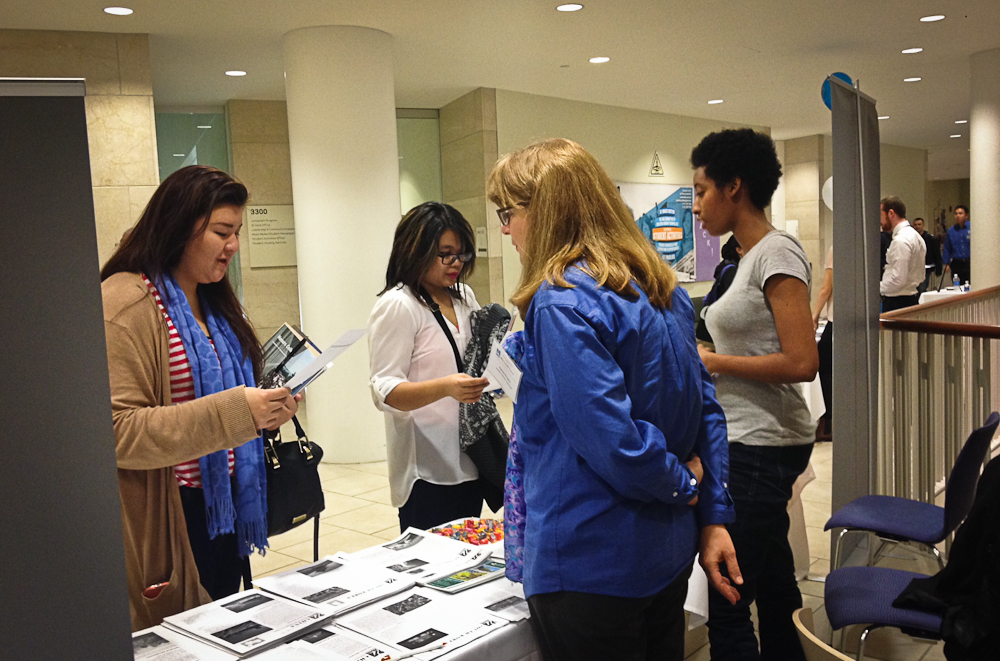
Prospective UMass Boston students learn about their study abroad opportunities during an open house. (Mallory Noe-Payne/WGBH).
Employers today want workers who are prepared to work in a global economy. One way students are gaining that exposure is by studying abroad. Today more than 289,000 American students go overseas during college. Still, that's just 10 percent of all students. Now, there’s a national push to make studying abroad more affordable and accessible.
It's open house night at the University of Massachusetts in Boston. Prospective students and their parents crowd around the study abroad booth, where the table is covered with black and white flyers promoting programs in Germany, India and Japan.
It's part of this urban university's attempt to raise awareness about its study abroad opportunities. Lurlene Van Buren is the study abroad coordinator here, where only one percent of students study overseas.
“Study abroad has always been popular and available and feasible for children of the affluent,” said Van Buren.
According to the Institute of International Education, study abroad students tend to be white, female and attend private liberal arts schools, schools like Boston University, where nearly half of students study abroad.
Unlike UMass Boston, Boston University’s robust program has been around since the 1970’s. The university's academic culture is built around the study abroad experience. You can see that on BU’s sleek study abroad website, featuring promotional videos.
But even still, at UMass Boston, the biggest barrier is financial.
“A lot of [our students] are financing their own education, which means they come to school here, then they leave and go to jobs," Van Buren said. "It's not so easy to get a semester off and have employment to come back to."
Related: Mind the Gap (Year): A Break Before College Might Do Some Good
Working helps a lot of students at UMass pay their $6,000 tuition bill. But for studying abroad, tuition is mostly the same. The difference in cost is often just a plane ticket or a couple months rent.
That's why UMass Boston is giving $1,000 scholarships to 25 students, hoping it's enough to bridge the gap.
It's all part of a national push to convince more students to go overseas.
“We're trying to double the number of Americans who study abroad by the end of the decade,” said Daniel Obst, with the Institute of International Education.
The Institute is connecting schools like Fitchburg State, Lesley University and Wheelock College to affordable foreign universities. It's also helping schools get the word out on why studying abroad is so important.
"What we see more and more is that employers are asking for students with global skills," Obst said. "We need essentially more Americans to go abroad so they understand how it is to work in foreign cultures."
Even if students get that, many still worry studying abroad will set them back and delay their graduation. That's why the Institute is working with colleges to make foreign programs a seamless part of their curriculum.
And while many still see studying abroad as an individual perk, Obst says it's increasingly important for developing a global workforce.
"It's more critical for American students to be able to work alongside their colleagues from around the world and be able to be effective in their jobs," said Obst.
At UMass Boston, Sankarah Philemon works for the study abroad office. The 26-year-old senior spent last year studying in Grenoble, France.
Philemon’s family helped her overcome the financial hurdle of studying abroad, but she still faced one more: Her family's expectations of what a college education should look like.
"For my family it was kind of hard to accept that. For them it was too long,'” Philemon recalled. "I was like 'No, I want to know the culture,' It was a risk."
Since she's come back, Philemon has been trying to convince other students to take the same risk she did. But it hasn't been easy.
“This is kind of scary,” Philemon said. “So being able to convince a student to pass that fear, it's hard.'"
That’s an attitude that educators are trying to change. Sure, it might be a risk to study abroad, but in this competitive global job market, it might be riskier not to.
Related: Richard Haass Calls On Higher Ed To Teach Global Citizenship










